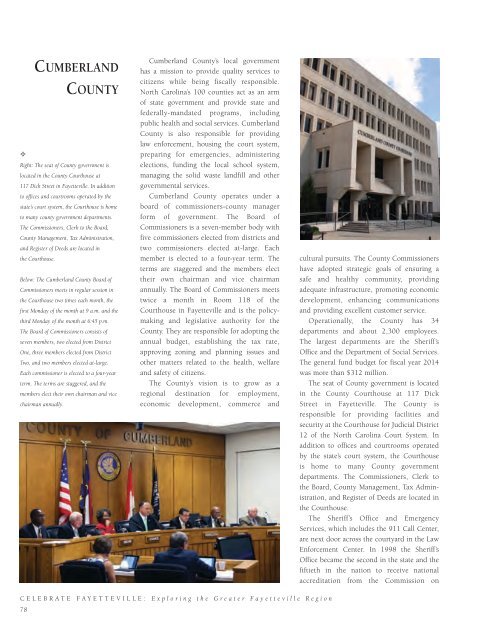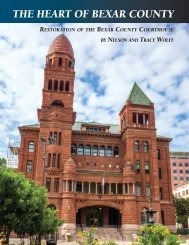Celebrate Fayetteville: Exploring the Greater Fayetteville Region
A full-color photography book showcasing Fayetteville, NC area, paired with the histories of companies, institutions, and organizations that have made the region great.
A full-color photography book showcasing Fayetteville, NC area, paired with the histories of companies, institutions, and organizations that have made the region great.
Create successful ePaper yourself
Turn your PDF publications into a flip-book with our unique Google optimized e-Paper software.
CUMBERLAND<br />
COUNTY<br />
✧<br />
Right: The seat of County government is<br />
located in <strong>the</strong> County Courthouse at<br />
117 Dick Street in <strong>Fayetteville</strong>. In addition<br />
to offices and courtrooms operated by <strong>the</strong><br />
state’s court system, <strong>the</strong> Courthouse is home<br />
to many county government departments.<br />
The Commissioners, Clerk to <strong>the</strong> Board,<br />
County Management, Tax Administration,<br />
and Register of Deeds are located in<br />
<strong>the</strong> Courthouse.<br />
Below: The Cumberland County Board of<br />
Commissioners meets in regular session in<br />
<strong>the</strong> Courthouse two times each month, <strong>the</strong><br />
first Monday of <strong>the</strong> month at 9 a.m. and <strong>the</strong><br />
third Monday of <strong>the</strong> month at 6:45 p.m.<br />
The Board of Commissioners consists of<br />
seven members, two elected from District<br />
One, three members elected from District<br />
Two, and two members elected at-large.<br />
Each commissioner is elected to a four-year<br />
term. The terms are staggered, and <strong>the</strong><br />
members elect <strong>the</strong>ir own chairman and vice<br />
chairman annually.<br />
Cumberland County’s local government<br />
has a mission to provide quality services to<br />
citizens while being fiscally responsible.<br />
North Carolina’s 100 counties act as an arm<br />
of state government and provide state and<br />
federally-mandated programs, including<br />
public health and social services. Cumberland<br />
County is also responsible for providing<br />
law enforcement, housing <strong>the</strong> court system,<br />
preparing for emergencies, administering<br />
elections, funding <strong>the</strong> local school system,<br />
managing <strong>the</strong> solid waste landfill and o<strong>the</strong>r<br />
governmental services.<br />
Cumberland County operates under a<br />
board of commissioners-county manager<br />
form of government. The Board of<br />
Commissioners is a seven-member body with<br />
five commissioners elected from districts and<br />
two commissioners elected at-large. Each<br />
member is elected to a four-year term. The<br />
terms are staggered and <strong>the</strong> members elect<br />
<strong>the</strong>ir own chairman and vice chairman<br />
annually. The Board of Commissioners meets<br />
twice a month in Room 118 of <strong>the</strong><br />
Courthouse in <strong>Fayetteville</strong> and is <strong>the</strong> policymaking<br />
and legislative authority for <strong>the</strong><br />
County. They are responsible for adopting <strong>the</strong><br />
annual budget, establishing <strong>the</strong> tax rate,<br />
approving zoning and planning issues and<br />
o<strong>the</strong>r matters related to <strong>the</strong> health, welfare<br />
and safety of citizens.<br />
The County’s vision is to grow as a<br />
regional destination for employment,<br />
economic development, commerce and<br />
cultural pursuits. The County Commissioners<br />
have adopted strategic goals of ensuring a<br />
safe and healthy community, providing<br />
adequate infrastructure, promoting economic<br />
development, enhancing communications<br />
and providing excellent customer service.<br />
Operationally, <strong>the</strong> County has 34<br />
departments and about 2,300 employees.<br />
The largest departments are <strong>the</strong> Sheriff’s<br />
Office and <strong>the</strong> Department of Social Services.<br />
The general fund budget for fiscal year 2014<br />
was more than $312 million.<br />
The seat of County government is located<br />
in <strong>the</strong> County Courthouse at 117 Dick<br />
Street in <strong>Fayetteville</strong>. The County is<br />
responsible for providing facilities and<br />
security at <strong>the</strong> Courthouse for Judicial District<br />
12 of <strong>the</strong> North Carolina Court System. In<br />
addition to offices and courtrooms operated<br />
by <strong>the</strong> state’s court system, <strong>the</strong> Courthouse<br />
is home to many County government<br />
departments. The Commissioners, Clerk to<br />
<strong>the</strong> Board, County Management, Tax Administration,<br />
and Register of Deeds are located in<br />
<strong>the</strong> Courthouse.<br />
The Sheriff’s Office and Emergency<br />
Services, which includes <strong>the</strong> 911 Call Center,<br />
are next door across <strong>the</strong> courtyard in <strong>the</strong> Law<br />
Enforcement Center. In 1998 <strong>the</strong> Sheriff’s<br />
Office became <strong>the</strong> second in <strong>the</strong> state and <strong>the</strong><br />
fiftieth in <strong>the</strong> nation to receive national<br />
accreditation from <strong>the</strong> Commission on<br />
C E L E B R A T E F A Y E T T E V I L L E : E x p l o r i n g t h e G r e a t e r F a y e t t e v i l l e R e g i o n<br />
78
















